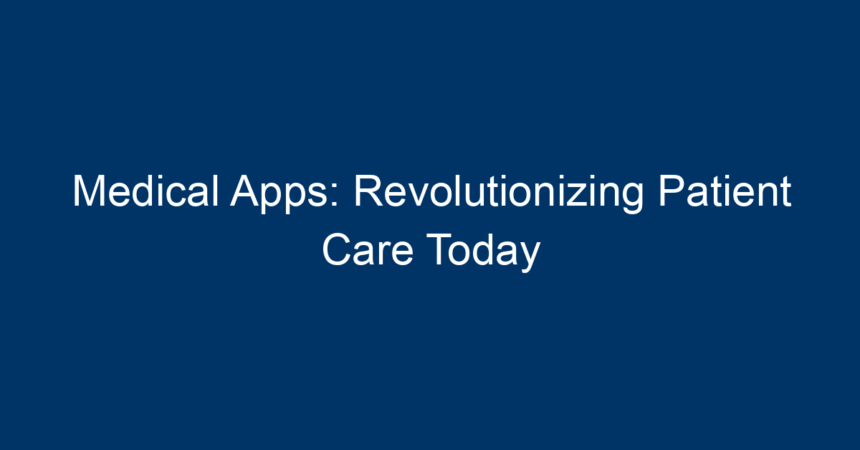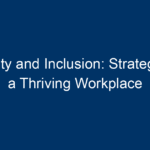In today’s fast-paced world, technology is transforming every aspect of our lives, and healthcare is no exception. The rise of medical apps has revolutionized patient care, making healthcare more accessible, efficient, and tailored to individual needs. From monitoring chronic conditions to facilitating telemedicine visits, the impact of medical apps on patient care is profound and far-reaching. This article explores how medical apps are changing the landscape of healthcare, offering insights for patients, healthcare providers, and innovators alike.
The Rise of Medical Apps
What Are Medical Apps?
Medical apps are software applications designed to support various aspects of healthcare, including diagnosis, treatment, and patient management. These apps can be used by healthcare professionals and patients alike, providing tools that range from symptom checkers to medication reminders, telehealth services, and even diagnostic tools.
Growth in the Mobile Health Market
According to recent studies, the global mobile health (mHealth) market, which includes medical apps, is projected to reach unprecedented levels. Factors contributing to this growth include the increasing prevalence of chronic diseases, the rising adoption of smartphones, and a shift towards patient-centered care.
Main Types of Medical Apps
1. Patient Monitoring Apps
Medical apps designed for patient monitoring help users track their health metrics over time. These apps can be connected to devices like blood glucose monitors, heart rate monitors, and fitness trackers, enabling a comprehensive view of a patient’s health. For instance, patients with diabetes can utilize apps to log blood sugar levels, diet, and medication, facilitating better management of their condition.
2. Telemedicine Apps
With the advent of telemedicine, patients can consult healthcare providers without needing to visit a clinic physically. Telemedicine apps connect patients with doctors via video chat, allowing for timely diagnosis and treatment. This has been especially crucial during global health crises, such as the COVID-19 pandemic, which limited in-person visits.
3. Medication Management Apps
Medication management is vital for effective treatment adherence. Apps in this category help patients organize their medications, send reminders for dosages, and track refills. By simplifying medication management, these apps contribute significantly to improved patient outcomes.
4. Mental Health Apps
Mental health is a crucial aspect of overall well-being, and many medical apps focus on providing support for mental health issues. These apps may offer guided therapy sessions, mood tracking, and tools for managing anxiety and stress, empowering users to take charge of their mental health.
5. Health and Wellness Apps
While not strictly "medical," health and wellness apps aim to promote a healthy lifestyle. These apps can provide exercise routines, nutritional advice, and stress management techniques, contributing to preventive health care.
Benefits of Medical Apps
Enhancing Patient Engagement
One of the most significant advantages of medical apps is their ability to engage and empower patients. By making health information accessible and tracking health metrics, patients feel more in control of their care. Enhanced engagement leads to better adherence to treatment plans and ultimately improves health outcomes.
Improved Communication
Medical apps streamline communication between patients and healthcare providers. Features such as secure messaging and appointment scheduling reduce barriers to healthcare access, allowing patients to receive timely responses to their questions and concerns.
Data-Driven Insights
With the help of medical apps, both patients and healthcare providers can collect valuable data that inform treatment decisions. These insights can lead to personalized care plans tailored to individual needs, improving overall patient satisfaction and outcomes.
Accessibility and Convenience
Medical apps make healthcare services more accessible to a broader audience. Patients in rural areas or those with mobility challenges can receive the same level of care as those in urban centers, breaking down geographical barriers.
Challenges and Considerations
Data Security and Privacy
While medical apps present numerous benefits, concerns about data security and patient privacy are paramount. Ensuring compliance with healthcare regulations, such as HIPAA (Health Insurance Portability and Accountability Act), is crucial for any medical app developer.
Quality and Reliability
Not all medical apps are created equal. The proliferation of apps in the market raises questions about their efficacy and reliability. It’s vital for patients to choose apps that are backed by scientific research and designed by qualified professionals.
User Experience
For medical apps to be successful, they must be user-friendly. A complicated interface can deter users, regardless of the app’s functionality. Developers must prioritize design and usability to ensure that their apps provide a seamless experience.
Future Trends in Medical Apps
Integration with Wearable Technology
The future of medical apps lies in their integration with wearable technology. Devices like smartwatches and fitness trackers can provide real-time health data that can be used by medical apps, allowing for more comprehensive monitoring and patient management.
Artificial Intelligence and Machine Learning
As technology continues to advance, the integration of artificial intelligence (AI) and machine learning into medical apps will enhance their capabilities. These technologies can help analyze data more effectively and even assist in diagnosing conditions based on user inputs and health data.
Personalization of Healthcare
The trend towards personalized healthcare will drive the development of more tailored medical apps. Future apps are likely to offer customized recommendations and treatment plans based on individual health data, lifestyle, and preferences.
Actionable Insights for Patients and Providers
For Patients
-
Do Your Research: Before downloading a medical app, read reviews and look for certifications. Ensure that the app is backed by healthcare professionals and adheres to industry standards.
-
Stay Engaged: Use medical apps actively. Regularly monitor your health metrics and communicate any changes with your healthcare provider.
- Maintain Privacy: Understand your rights regarding data privacy and ensure that the app you choose prioritizes user privacy and security.
For Healthcare Providers
-
Leverage Technology: Embrace the use of medical apps in your practice. They can enhance patient engagement and streamline communication.
-
Educate Patients: Help your patients understand how to use medical apps effectively. Provide resources and support for choosing the right apps.
- Stay Informed: Keep up with the latest trends in medical technology to offer the best care possible and maintain a competitive edge in the healthcare market.
Conclusion
Medical apps are not just a trend; they represent a significant evolution in how we approach patient care. With benefits ranging from enhanced patient engagement to improved communication and personalized treatment plans, their impact is undeniable. As healthcare continues to advance, embracing technology will be essential for both patients and providers. Keeping an eye on future trends and addressing current challenges will ensure that the full potential of medical apps is realized in revolutionizing patient care. Whether you are a patient seeking better control over your health or a provider looking to improve patient outcomes, the world of medical apps offers unprecedented opportunities for transformation.




